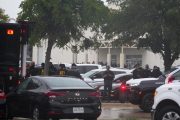A network of 77 “fusion” intelligence centers, set up around the country under the auspices of the federal Department of Homeland Security, has over the past decade uncovered little information that could be useful in defending the nation against terrorism. It also created numerous reports on the legal, everyday of activities of ordinary Americans, according to a Senate report released Tuesday.
In Federal Support for And Involvement in State and Local Fusion Centers, the Senate Permanent Subcommittee on Investigations wasted no time in panning the work of the centers, which the panel found to be of little to no value in guarding the nation against the threat of domestic terrorism. Instead, the centers themselves pose a threat to our constitutional liberties, as the report noted early in its executive summary:
The Subcommittee investigation found that DHS-assigned detailees to the fusion centers forwarded “intelligence” of uneven quality — oftentimes shoddy, rarely timely, sometimes endangering citizens’ civil liberties and Privacy Act protections, occasionally taken from already-published public sources, and more often than not unrelated to terrorism.
The centers, established to “fuse’ the efforts of state and law enforcement agencies with those of federal investigators in uncovering security threats, has produced an undetermined number of reports like the following:
• “Ten Book Recommendations for Every Muslim,” a list of reading suggestions offered by a Muslim community group, included books by four authors whose names were listed in a terrorism database.
• “Possible Drug Smuggling Activity” was reported by a pair of state wildlife officials who spotted two men in a fishing boat “operating suspiciously” in water near the U.S.-Mexico border. The report noted that the fishermen “avoided eye contact” and that their boat appeared to be low in the water, “as if it were laden with cargo.”
Fusion centers have created headlines and generated outrage and ridicule in recent years by sending out alerts about Ron Paul bumper stickers, the American Civil Liberties Union, activists for and against legalized abortion, and gun-rights advocates.
After reviewing more than 600 unclassified reports over a one-year period, “The subcommittee investigation could identify no reporting which uncovered a terrorist threat, nor could it identify a contribution such fusion center reporting made to disrupt an active terrorist plot,” said the report of the subcommittee, chaired by Democrat Carl Levin of Michigan, with Tom Coburn of Oklahoma the ranking Republican.
There is no telling how much taxpayer money was spent in preparing the fusion reports, since Congress has created such a complicated, multi-sourced grant process that even Department of Homeland Security officials don’t know how much money they have received and spent on the centers. The fusion centers are under the authority of the DHS, but are funded mainly by grants to local governments from the Federal Emergency Management Agency. The Senate panel estimated that somewhere between $289 million and $1.4 billion in federal appropriations were spent on the fusion centers between 2003 and 2011. Federal spending accounts for 20 to 30 percent of the costs of operating the fusion centers, the report said, with the remaining 70 to 80 percent funded by state and local governments.
Whatever the total dollar amount is, the fusion centers have had enough money to spend heavily on data-mining software, flat-screen televisions and, in Arizona, two fully equipped Chevrolet Tahoes that are used for commuting, investigators found. Though the millions, or possibly billions, spent on the fusion centers has produced little of value, according to the report, Congress is unlikely to cut off or even reduce funding for the program. Its effectiveness, or lack thereof, in uncovering terrorist threats might be less important to members than the politically rewarding effects of sending all that money home to state and local law enforcement agencies.
And it may also be difficult to make a convincing case about the inefficiency of the centers in fulfilling their mission when the Department of Homeland Security can’t tell us what the mission is. Testifying before Congress last year, Secretary of Homeland Security Janet Napolitano pointed to the FBI’s Joint Terrorism Task Force as the federal, state and local effort dealing directly with the domestic terrorist threat.
“A JTTF is really focused on terrorism and terrorism-related investigations,” the Secretary said. “Fusion centers are almost everything else.”
Given the difficulty of evaluating in any definitive way “almost everything else,” Congress will likely go on funding it.
Aside from the cost, there are issues of civil liberties involved in the practice of spying and reporting on the reading and fishing activities or the parenting advice given by people here in the “Homeland.” Indeed the problem has been recognized by officials in the Department of Homeland Security, who rejected many of the reports cited by the Senate panel.
“We cannot report on books and other writings” just because the authors are named in a terrorism database, a DHS reviewer in Washington wrote in response to the report on the reading list put out by the Muslim community group. “The writings themselves are protected by the First Amendment unless you can establish that something in the writing indicates planning or advocates violent or other criminal activity.”
“The number of things that scare me about this report are almost too many to write into this (form),” a Homeland Security reviewer wrote after analyzing the report on the motivational talk and lecture on “positive parenting” at the Muslim center in Santa Cruz. The reviewer noted that “the nature of this event is constitutionally protected activity (public speaking, freedom of assembly, freedom of religion.)”
Another reviewer was obviously frustrated over the report on the men in the fishing boat by officials who suspected drug smuggling. “The fact that some guys were hanging out in a boat where people normally do not fish MIGHT be an indicator of something abnormal, but does not reach the threshold of something we should be reporting,” the Homeland Security official wrote, adding that the report “should never have been nominated for production, nor passed through three reviews.”
That the report was ultimately nixed should be mildly encouraging, though the fact that it had earlier passed three reviews says something about the size and efficiency of the DHS bureaucracy. But the Senate panel also wanted to know why reports on legal activities were stored at Homeland Security headquarters in Washington for a year or more after they had been canceled. The storage is an apparent violation of the U.S. Privacy Act, which prohibits federal agencies from keeping information on constitutionally protected activities without a valid reason. The practice is also in conflict, the report said, with DHS guidelines, which mandate that once a determination is made that a document should not be maintained, “the U.S person identifying information is to be destroyed immediately.”
“It was not clear why, if DHS had determined that the reports were improper to disseminate, the reports were proper to store indefinitely,” the Senate report said. DHS replied that the canceled reports could still be retained “for administrative purposes such as audit and oversight.”
Homeland Security Department spokesman Matthew Chandler called the Senate’s report on fusion centers “out of date, inaccurate and misleading,” the Associated Press reported. Chandler faulted the report for focusing only on information produced by fusion centers while not considering the benefit to state and local officials in receiving intelligence from the federal government.
Yet the vacuous nature of that “intelligence” appears to be the entire point of the report. The subcommittee discovered that until this year, the federal reports officers at the fusion centers received five days of training and were never tested or graded afterward. One unidentified Homeland Security official described the problem in stark terms:
You would have some guys, the information you’d see from them, you’d scratch your head and say, “What planet are you from?”
Photo of Combined Intelligence and Fusion Center for NORAD/Northcom in Colorado Springs: AP Images
Related article:
Justice Department Trained Police to Link Political Activism With Terror




